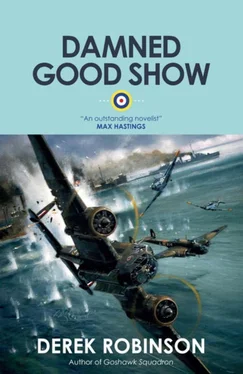“This is heaven.” She stopped so that they could kiss. “If you ever leave me I’ll kill you.”
“Can’t kill me if I’ve got the chop.” Not a clever remark; he was sorry he’d said it. “Anyway, the circumstance won’t arise. That’s another of my brilliant decisions. Who’s that tall bloke over there?”
“Giles Palfrey. Retired banker. Why?”
“He kept shouting at me. I nearly killed him, too.”
“Dear me,” she said. “Another failure. You’re really rotten at killing people, aren’t you, darling?”
“Utterly hopeless,” he said, and felt much better for it. Sometimes it paid to lose.
The dance ended. He went looking for champagne, and met the bishop. “At one stage today I feared you were about to expire,” the bishop said. “I’ve never administered the last rites during a wedding service, and I’m not sure I know the drill. But you’re looking much better now.”
“Thank you. I’ve been married all afternoon, and I think I’ve got the hang of it. I’ve discovered that sometimes it pays to lose.”
“Highly unlikely. In my experience of matrimony, if you think you’ve won, you’ve lost, and if you think you’ve lost, you really have lost.”
“Oh. Well, in that case, I’ll settle for a draw.”
“Then you’re disqualified.” The bishop smiled cheerfully and patted Langham on the shoulder. “Remember those rules, old chap, and you should have a straightforward run to the grave.”
1
The couple took their brief honeymoon in London, in Albany. It was her idea. “Lincolnshire is dreary,” she said. “We shall get more than enough of it soon.” They went by train, first class. He slept most of the way. In the taxi from King’s Cross, she said, “You were dreaming, darling.”
“Was I?” He thought about it. “Yes. I met my father.”
“Didn’t you tell me he was dead?”
“Yes. But so was I, you see. Dead as a doughnut.”
“Dodo, darling. Dead as a dodo.”
He frowned. “My father wouldn’t make that sort of mistake.”
She saw that it disturbed him. “Darling, dodo or doughnut, it really doesn’t matter. They’re much the same.”
“Doughnuts don’t die. It’s absurd. So I couldn’t have been dead.”
“Of course not. Was it all a joke, d’you suppose?”
“Maybe. My father used to like playing practical jokes, but still…”
“A practical joke about death is carrying things a bit far.”
“Yes. Anyway, I hate doughnuts. If they serve doughnuts in Heaven, I’m not going.” He had shaken off the dream and was cheerful again.
They spent most of the next three days in her apartment, and much of that time in bed.
On the evening of the second day, as they shared yet another sexual triumph, and separated, they lay with their fingers linked, letting the sweat cool their bodies. “You’re not a woman,” he said amiably, “you’re an animal.”
“Goody. I’ve always wanted to be a blue-assed baboon. They have such fun.”
“I doubt if even baboons keep up our sort of pace. I’m not complaining.”
“Good. Neither am I, darling.”
“It’s just that you have a way of looking at me, and when you do, I get a slight pain down below. In my wedding tackle, not to put too fine a point on it.”
She propped herself on an elbow and studied his collapsed penis. “We haven’t put too fine a point on it, dearest.” She raised it with her index finger. “You’ve got oodles of wear left in you.”
“What a comfort you are. All the same…”
“You’re suffering from chronic shortage of gin, my sweet.” She slipped out of bed. “Gin cures all. If Hitler drank gin he wouldn’t be in such a frightful paddy with everyone.”
While she was away, he thought about D-Dog and the rapidly magnifying patch of Lincolnshire that had so nearly become a large crater, burned black all around. The picture came to him less often, but it still caused a kick in his heartbeat. He had wondered about telling Zoë, realized it would mean explaining stabilized yaw, and decided against it.
She came back with the drinks.
“Something rather odd happened during our wedding ceremony,” he said. “Cheers… I had the sensation of being high up, near the roof, watching myself get married.”
“I’ve had that. Not for years, though. How did you get down?”
“Oh… sideslipped, with full flap and a touch of rudder. By the way, you ought to know: I’ve made my will.”
She almost said, But you’re broke. Instead she said, “How thoughtful, darling. Anything special in it for me?”
“Um… the castle. And my lucky mascot. Never fly without it.”
“Marvelous.” She snuggled against him. They linked arms and sipped each other’s gin. She didn’t point out that if she ever got his lucky mascot, it couldn’t have been very lucky. Nobody said being in love meant being honest.
2
Rafferty gave him permission to live out. Bardney Castle was only a fifteen-minute drive from Kindrick. He bought a lemon-yellow Frazer-Nash two-seater for ten pounds from an army officer who was being posted to Egypt. It seemed in style.
Owning a big house was rather like getting his commission. It had been good for the ego to be saluted wherever he went; now it was gratifying to be lord of this manor. Gardeners stopped work and doffed their caps. The staff smiled at the dashing young pilot as he headed for the lawns, a pair of black Labradors at his heels. He’d borrowed the dogs from the gamekeeper, but who cared? He enjoyed chucking bits of branch for them to chase. It was a hoot. The whole thing was a hoot.
Obviously he asked some of the boys to come over for a meal. No point in a splendid hoot unless you can share it. Tom Stuart came with Silko, Tubby Heckter and Jonty Brown. Langham planned to be outside to meet them when they arrived, but the blackout curtains in his suite got stuck. It took two servants and a stepladder to sort out the problem, and that was when the butler knocked on the door, entered, stepped aside and announced, “Squadron Leader Stuart.”
“Bloody hell,” Langham muttered, and hurried forward with an unhappy grin, too late to stop the butler announcing the other three names. “Honestly, I don’t normally do this,” Langham said. Stuart gave a brief nod which made it obvious he was not impressed.
They met Zoë, and in the flurry of getting drinks and making small talk, the atmosphere improved. She told some amusing stories about the castle’s alleged ghosts and eccentric owners. The butler announced that dinner was served. They trooped into the next room and in a gut-freezing instant Langham knew that this was all a terrible mistake. The table was too big, the plates were gilt-edged, there were battalions of crystal wineglasses and regiments of silver cutlery. The candelabra blazed. The napkins had been woven by virgins and monogrammed by the Royal School of Needlework. It was too rich for a bunch of bomber pilots.
“Just dry toast for me,” Tubby Heckter said. “I’m on a diet.” Not a funny joke.
Servants eased the chairs forward as the guests sat, in case someone pulled a muscle.
Artichoke soup was served. Scallops in cream were served. Tournados Rossini were served. Banana soufflé with hot chocolate sauce was served. Tiny savories tasting of bacon were served. A large ripe Stilton was wheeled in. Many wines had come and gone. Port circulated. None of this made conversation easier.
Zoë was the problem: she didn’t understand their shop, and they weren’t interested in her life in London. As the endless meal wore on, she grew bored, stopped trying, became remote. The butler’s presence didn’t help. He saw, and oversaw, everything. At one point Jonty Brown used the wrong knife, and realized it, and felt so guilty that, in his confusion, he drank half his finger-bowl. It was a silver finger-bowl, very handsome. Anyone might have done the same.
Читать дальше












